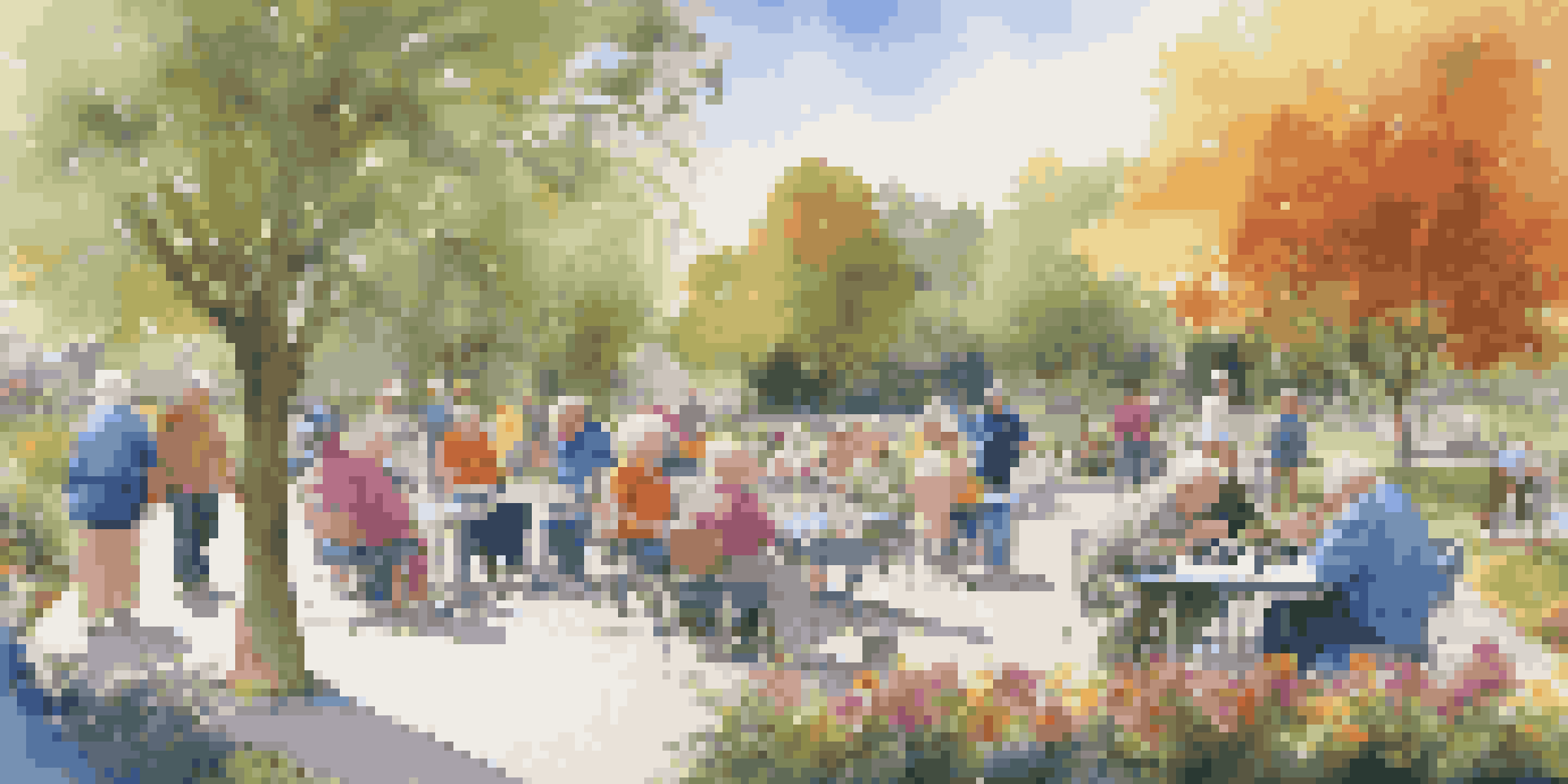Understanding the Aging Process: Key Factors for Healthy Living

The Science Behind Aging: What Happens to Our Bodies?
Aging is a natural process that involves various biological changes in our bodies. As we age, our cells undergo wear and tear, which can affect their functionality. For instance, our skin loses elasticity, and our muscles may weaken over time. Understanding these changes can help us better manage our health as we grow older.
Aging is not lost youth but a new stage of opportunity and strength.
Moreover, aging impacts our immune system, making us more susceptible to illnesses. This is why it's crucial to prioritize preventive healthcare, like regular check-ups and vaccinations. By staying informed about these age-related changes, we can adopt healthier habits that support our well-being in later years.
Lastly, the aging process also affects our cognitive functions. Many people experience memory lapses or slower processing speeds. Engaging in mental exercises, such as puzzles or reading, can help keep our minds sharp, proving that it's never too late to embrace lifelong learning.
Nutrition: Fueling Your Body for Healthy Aging
Nutrition plays a pivotal role in how well we age. A well-balanced diet rich in fruits, vegetables, whole grains, and lean proteins can help stave off chronic diseases. For example, incorporating omega-3 fatty acids, commonly found in fish, has been linked to improved heart health. This shows that what we eat directly influences our aging journey.

Hydration is another critical aspect that is often overlooked. As we age, our body’s ability to retain moisture diminishes, making us more prone to dehydration. Drinking plenty of water not only supports bodily functions but also keeps our skin healthy and vibrant. So, remember to drink up—your body will thank you!
Nutrition Fuels Healthy Aging
A balanced diet with fruits, vegetables, and lean proteins is crucial for preventing chronic diseases and supporting overall health as we age.
Additionally, being mindful of portion sizes and limiting processed foods can enhance our overall health. Small changes, like swapping sugary snacks for fresh fruit, can make a big difference. By prioritizing nutrition, we empower ourselves to age gracefully and maintain our vitality.
Physical Activity: Staying Active for Longevity
Regular physical activity is essential for maintaining health as we age. Exercise helps strengthen muscles, improve balance, and enhance flexibility. Even simple activities like walking or gardening can significantly contribute to our physical well-being. Think of exercise as a gift to your future self—investing time now pays off later.
You are never too old to set another goal or to dream a new dream.
Moreover, staying active can elevate mood and reduce feelings of loneliness or depression. Engaging in group activities, like dance classes or community sports, fosters social connections. These relationships are crucial for mental health, proving that exercise benefits not just the body but the mind as well.
Lastly, it's important to choose activities that you enjoy. If you love hiking, make it a weekly ritual; if dancing is your passion, find a local class. The key is to stay consistent and make movement a fun part of your daily routine.
Mental Health: Prioritizing Your Emotional Well-Being
As we age, keeping our mental health in check is just as important as physical health. Emotional well-being can influence everything from our relationships to our overall quality of life. Engaging in mindfulness practices, such as meditation or yoga, can help reduce stress and promote a positive outlook on life.
Social interactions also play a significant role in maintaining mental health. Regularly connecting with friends and family can combat feelings of isolation. Consider joining clubs or volunteering; these activities can not only bring joy but also foster a sense of purpose as you engage with your community.
Social Connections Enhance Well-Being
Maintaining strong social ties can reduce feelings of isolation and contribute to emotional stability and happiness in later years.
Additionally, it's essential to recognize when to seek professional help. Sometimes, talking to a therapist can provide the support needed to navigate life's challenges. Remember, taking care of your mental health is a vital part of the aging process.
Sleep: The Unsung Hero of Healthy Aging
Sleep is often overlooked but is crucial for healthy aging. As we get older, our sleep patterns can change, leading to issues like insomnia or disrupted sleep cycles. Quality sleep is necessary for cognitive function, emotional stability, and physical health. Think of sleep as your body's time to recharge; without it, everything else suffers.
Establishing a bedtime routine can help improve sleep quality. This could include winding down with a book, turning off screens an hour before bed, or practicing relaxation techniques. Creating a comfortable sleep environment—dark, quiet, and cool—can also aid in achieving restful sleep.
Moreover, if sleep problems persist, consider consulting a healthcare professional. They can help identify underlying issues and suggest appropriate solutions. Prioritizing sleep can lead to a more vibrant and energetic life as you age.
Social Connections: Building a Supportive Network
Maintaining strong social connections is vital for healthy aging. As we age, friendships and family ties can wane, leading to feelings of isolation. Engaging with others can provide emotional support, reduce stress, and promote a sense of belonging. Think of your social circle as a safety net; the stronger it is, the safer you feel.
Joining clubs or participating in community events can help foster new relationships. Whether it's a book club, a cooking class, or a local volunteer group, these activities create opportunities to meet like-minded individuals. Building new connections can be as fulfilling as nurturing existing ones.
Preventive Healthcare is Essential
Regular check-ups and screenings are vital for catching potential health issues early, allowing for proactive management of our health.
Remember, quality often trumps quantity. It's better to have a few close friends than a large group of acquaintances. Nurturing these relationships can lead to a more enriched life, filled with joy and companionship as you navigate the aging process.
Preventive Healthcare: Staying Ahead of Health Issues
Preventive healthcare is a cornerstone of healthy aging. Regular check-ups, screenings, and vaccinations can help catch potential health issues before they escalate. For instance, annual wellness visits can identify risk factors for chronic diseases early on, allowing for timely intervention. Think of preventive care as a shield; it protects you from future health battles.
Staying informed about your health history and family genetics can also guide your preventive measures. If certain conditions run in your family, discussing these with your doctor can help tailor a proactive health plan. Knowledge is power when it comes to aging gracefully.

Additionally, being proactive about mental health screenings is just as important. Regular check-ins with a mental health professional can help maintain emotional well-being. Remember, taking charge of your health now can lead to a more fulfilling and active life in the future.